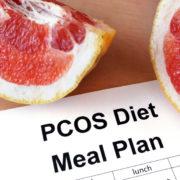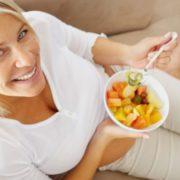Recommended diet during pregnancy
in female fertilityDuring pregnancy, the body´s needs in food and nutrition change. In general, the body needs more of everything. But that´s only one half of the story. The truth is: the baby will need a little bit of extra calories, round about 20% or 250 kcal per day. But it will need much more of several vitamins, polyunsaturated fatty acids, minerals and trace elements to support the rapid growth. That´s usually double the amount from the normal diet.
Lacks of micronutrients like folic acid might be seriously negative fo the child´s development, i.e. in the first weeks of pregnancy. Therefore, a balanced diet of the future mother is now much more important than before.
This article summarizes the most important and widely accepted health and diet recommendations during pregnancy.
What a future mother should eat
Not double the amount, but double as healthy
Since the extra needed calories are just a few more (plus 20% in the second half of the pregnancy), it´s important that your food is healthy.
Some remarks by topic:
Calories
Calories are necessary. It´s the energy for your brain and your muscles. Potatoes and full wheat are better calories than sugar. You will only need around 250 kcal more in energy which is not more than a standard yoguhrt a day. If you eat more on top, you will probably add more weight than necessary.
Fat
Fat is an essential part of the diet. Although your initial reaction to “fat” will probably be “Uuuh, bad, I should better avoid fat“, it´s actually very necessary for the child´s development. But: it depends on what kind of fat you are taking in. Most fat in processed food is coming from saturated fatty acids. This is “bad fat”. Good fat is fat with high percentage of polyunsaturated fatty acids, i.e. omega-3 fatty acids. There are a number of different omega-3 fatty acids.
The most interesting for the development of nerves, the eyes, the brain and motoric system are omega-3 fatty acids from fish, DHA and EPA. This is why nutrition specialists recommend eating fish twice a week.
Olive oil, sunflower oil or oil from soy is rich in omega-3 fatty acids (but they lack DHA and EPA, which are found in fish and seafood only). If you do not eat fish this often, you might consider supplementing DHA and EPA with a product like amitamin® fertil F.
Dietary fibres
Eating lots of vegetables and fruits is more important now than ever. They contain dietary fibres, which supports the management of the energy levels and blood sugar levels.
Amino acids
Amino acids are the building blocks of life. They are essential for most of our metabolic processes. Amino acids are needed to construct and repair tissue, in our entire body. A generally accepted advice is that you take an extra of 15 grams to 30 grams of amino acids and proteins per day.
Vitamins
 There are thirteen vitamins which are essential for the human body. They are necessary for metabolic processes. To support a healthy immune system, you might consider taking an extra portion of Vitamin C and Vitamin D, amongst other vitamins.
There are thirteen vitamins which are essential for the human body. They are necessary for metabolic processes. To support a healthy immune system, you might consider taking an extra portion of Vitamin C and Vitamin D, amongst other vitamins.
Folic acid is the most well known vitamin during pregnancy. It is so important because the lack of folic acid causes a four times higher risk for the fetus to develop spina bifida. It is important to start taking care of a sufficiently high folate level well before pregnancy, because Spina bifida develops in the first two weeks and is irreversible. Nutritional supplements like amitamin® fertil F are a way to be sure that your intake of folate is adequate.
General recommendations for a healthy and balanced diet include 5 portions of vegetables and fruits per day as well as fish from marine sources twice a week. Although one may get enough vitamins, trace elements and omega-3 fatty acids with a balanced diet, large studies show that in reality many people do not show a sufficient intake of many vitamins and minerals. The national food consumption study took a close look at 20,000 people from all ages and gender and found out that, amongst other:
- 80% – 90% do not take in sufficient amounts of folic acid (below 200µg per day),
- 75% of women between 15 and 50 have a too low iron intake,
- 50% do not eat enough food with Vitamin E,
- 33 % do not meet minimum levels of Vitamin C (80 mg daily),
- 27% of men do not take sufficient amounts of zinc with their food.
Trace elements
Trace elements like iron and zinc are needed in higher amounts than usual. Women with a vegan diet may show a low level of certain trace elements, i.e. of iron.
Iodine is another trace element which is very much in focus in the mother´s diet. A lack of iodine might not be beneficial to the baby´s development of brain and nerve functions.
Minerals
Minerals like Magnesium and Calcium are important for the development of bones and teeth. Drink a glass of milk a day extra and more vegetables to support your baby´s development.
Water
You should drink around 2,5 litres per day to support all metabolic processes. Tea without sugar, water and natural fruit juices are the drinks you should prefer.
Supplements during pregnancy
To ensure that your baby has the right amount of these micronutrients available, you should consider supporting your diet with a nutritional supplement like amitamin© fertil F. It was designed exactly for the needs during pregnancy and until lactation. It´s formula is much more advanced and dosage more generous than what you probably know. Compare it and decide yourself what is best for you and your toddler!
What (food) to avoid during pregnancy
There are a couple of no-no´s during pregnancy. While it might sometimes feel hard: you owe this to your child!
Alcohol
Alcohol during pregnancy is an absolute no-go. Alcohol takes 20 (!!!) times longer in the unborn child to be washed out again.
German statistics confirm that a sad 10,000 babies per year (around three percent) are born with a fetal alcohol spectrum disorder (FASD). Even a glass sometimes might be too much. Read more here on wikipedia on FASD. And please, for the sake of your baby´s child: fully avoid alcohol during these nine months!
Nicotin / smoking
Smoking and i.e. nicotin is damaging fertility as well as it has unfavourable effects on the development of the fetus. This includes electric cigarettes which usually contain nicotine as well. It is therefore in the best interest of your health and the baby´s health to stop smoking as soon as you think about becoming pregnant.



